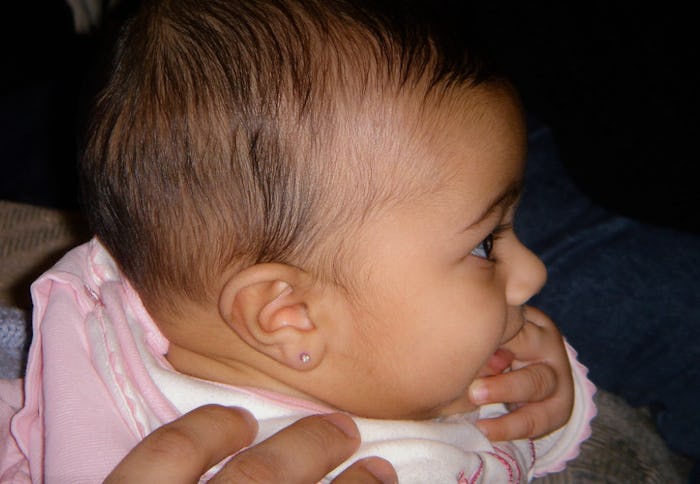Life

Is There Ever A “Wrong” Reason To Pierce Your Baby’s Ears?
When my daughters were born, I knew that as soon as their pediatrician would give the green light, I’d go to my local mall and have their ears pierced. Coming from an Indian background, wearing earrings is part of the culture, so there was never a doubt in my mind — no question at all. In recent years, however, I’ve been seeing more of a social debate questioning the propriety of this decision, taking some truly important factors into consideration. That's why Romper chose to take this hot button issue of piercing your child's ears and turn it into real talk with the second episode of our Bearing the Motherload video series (embedded below!). In the series, two parents with different opinions on the same issue (in this case, piercing a child's ears), sit down with a moderator to hear each other out and get input from experts.
I spoke with Rosalind Wiseman, author of The New York Time’s best-seller Queenbees and Wannabees, who appears in the episode. Wiseman, who is also an educator and the founder of Cultures of Dignity, an organization devoted to the physical and emotional well being of young people, tells me that, while much of the discussion ends up being based on stealing your child’s right to consent, the real issue lies within how fast we force our children to comply to gender expectations. “In the case of ear piercing, what this is really about is gendering our children at the earliest age possible because we can't tolerate a child just being a child,” she says.
Wiseman explains that in order to “know” how to interact with the child, people tend to label them as a boy or a girl from infancy, but she questions the importance of this label. “Does it matter what sex the child is to hold them and care for them?” asks Wiseman. "All children need that, without also getting all of our baggage and expectations about how they could be and act as a boy or girl.” She also recognizes that while there may be a cultural commitment that parents are adhering to, traditions in any culture aren’t sacred and should be able to be challenged and examined against the larger values the culture holds.
Wiseman's words about challenging cultural norms ring true to me — as societies progress, cultures do change and morph to better suit evolving social dynamics. For example, as a Muslim woman of Indian heritage, I have chosen not to adopt certain traditions that I deem unnecessary, including covering my hair or wearing gold bangles to signify my marriage (similar to always wearing a wedding ring). But while I may have given up some aspects of my culture, there are others that I just don’t want to part with.
For the cultural side of the debate, Romper invited author, educator, and diversity expert, Farhat Khan to weigh in during the episode. I also spoke with Khan, who served as director of the Chicago Public Schools’ Multicultural Resource Center for over a decade. Khan validated my take that ear piercing is an integral part of many cultures, and is considered a rite of passage in many countries. She explains that in some cultures this event is so celebrated that it's often accompanied by rituals and ceremonies with folk songs and music.
Khan says that customs like these help people identify with their roots and can provide a sense of community and belonging: “Rites of passage are an intricate piece of humanity you can find anywhere in the world, now and throughout history and they play a part in a person’s ability to identify as a member of their particular cultural group.”
If the decision to pierce your child’s ears is based on cultural values rooted in identity, then Khan says that right lies with the parents. “The decision to be a member of a cultural group is a parental right, and parents have the right to introduce their children to cultural traditions and customs.” She says that parents don’t ask a child for their opinion on whether they want to go to school or go to the mall without supervision at a young age, so similarly they may not think they need to ask about piercing their ears. For people from certain cultures, it’s just part of what they need to do.
I come from a culture where ear piercing is a rite of passage, so my two daughters have worn earrings ever since I had their ears pierced at 4 months old. But I also don’t believe in forcing gender norms, and I never pushed my girls into being anything other than just kids. One of my daughters is a girly girl who loves pretty dresses and dolls, and the other is a tomboy — with gold earrings — who loves to play video games in a crumpled T-shirt and jeans. That being said, I do remind my daughters that as women, they have to be strong and unafraid to make their mark in a society where they are still treated unequally, and if that requires me labeling them as girls, then I’m guilty of that.
As far as culture dictating norms, I think culture should be whatever you want it to be for you. Ultimately, whether you have a little boy or a little girl, the choice to pierce their ears is wholly yours, and its propriety should be based on your personal values and opinions over anyone else’s.
Check out Romper's new video series, Bearing The Motherload, where disagreeing parents from different sides of an issue sit down with a mediator and talk about how to support (and not judge) each other’s parenting perspectives. New episodes air Mondays on Facebook.